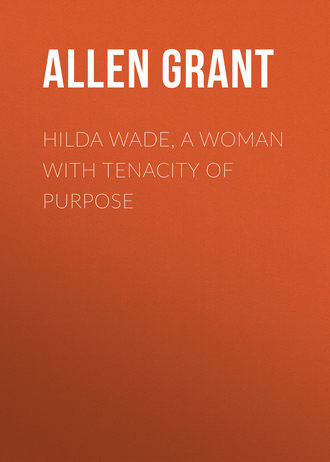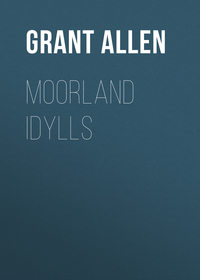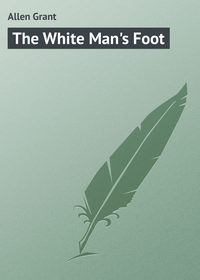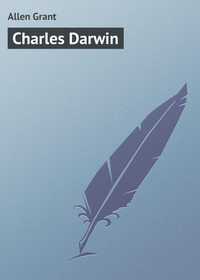 полная версия
полная версияHilda Wade, a Woman with Tenacity of Purpose
“Will he reach it?” I asked, anxiously, having my own idea on the subject.
“Doan’t seem like ut, zur, do ut? Ur must, an’ ur mustn’t, an’ yit again ur must. Powerful ‘ard place ur be to maake in a starm, to be zure, Lundy. Zaid the Lord ‘ould dezide. But ur ‘ouldn’t be warned, ur ‘ouldn’t; an’ voolhardy volk, as the zayin’ is, must go their own voolhardy waay to perdition!”
It was the last I saw of Le Geyt alive. Next morning the lifeless body of “the man who was wanted for the Campden Hill mystery” was cast up by the waves on the shore of Lundy. The Lord had decided.
Hugo had not miscalculated. “Luck in their suicides,” Hilda Wade said; and, strange to say, the luck of the Le Geyts stood him in good stead still. By a miracle of fate, his children were not branded as a murderer’s daughters. Sebastian gave evidence at the inquest on the wife’s body: “Self-inflicted—a recoil—accidental—I am SURE of it.” His specialist knowledge—his assertive certainty, combined with that arrogant, masterful manner of his, and his keen, eagle eye, overbore the jury. Awed by the great man’s look, they brought in a submissive verdict of “Death by misadventure.” The coroner thought it a most proper finding. Mrs. Mallet had made the most of the innate Le Geyt horror of blood. The newspapers charitably surmised that the unhappy husband, crazed by the instantaneous unexpectedness of his loss, had wandered away like a madman to the scenes of his childhood, and had there been drowned by accident while trying to cross a stormy sea to Lundy, under some wild impression that he would find his dead wife alive on the island. Nobody whispered MURDER. Everybody dwelt on the utter absence of motive—a model husband!—such a charming young wife, and such a devoted stepmother. We three alone knew—we three, and the children.
On the day when the jury brought in their verdict at the adjourned inquest on Mrs. Le Geyt, Hilda Wade stood in the room, trembling and white-faced, awaiting their decision. When the foreman uttered the words, “Death by misadventure,” she burst into tears of relief. “He did well!” she cried to me, passionately. “He did well, that poor father! He placed his life in the hands of his Maker, asking only for mercy to his innocent children. And mercy has been shown to him and to them. He was taken gently in the way he wished. It would have broken my heart for those two poor girls if the verdict had gone otherwise. He knew how terrible a lot it is to be called a murderer’s daughter.”
I did not realise at the time with what profound depth of personal feeling she said it.
CHAPTER V
THE EPISODE OF THE NEEDLE THAT DID NOT MATCH
“Sebastian is a great man,” I said to Hilda Wade, as I sat one afternoon over a cup of tea she had brewed for me in her own little sitting-room. It is one of the alleviations of an hospital doctor’s lot that he may drink tea now and again with the Sister of his ward. “Whatever else you choose to think of him, you must admit he is a very great man.”
I admired our famous Professor, and I admired Hilda Wade: ‘twas a matter of regret to me that my two admirations did not seem in return sufficiently to admire one another. “Oh, yes,” Hilda answered, pouring out my second cup; “he is a very great man. I never denied that. The greatest man, on the whole, I think, that I have ever come across.”
“And he has done splendid work for humanity,” I went on, growing enthusiastic.
“Splendid work! Yes, splendid! (Two lumps, I believe?) He has done more, I admit, for medical science than any other man I ever met.”
I gazed at her with a curious glance. “Then why, dear lady, do you keep telling me he is cruel?” I inquired, toasting my feet on the fender. “It seems contradictory.”
She passed me the muffins, and smiled her restrained smile.
“Does the desire to do good to humanity in itself imply a benevolent disposition?” she answered, obliquely.
“Now you are talking in paradox. Surely, if a man works all his life long for the good of mankind, that shows he is devoured by sympathy for his species.”
“And when your friend Mr. Bates works all his life long at observing, and classifying lady-birds, I suppose that shows he is devoured by sympathy for the race of beetles!”
I laughed at her comical face, she looked at me so quizzically. “But then,” I objected, “the cases are not parallel. Bates kills and collects his lady-birds; Sebastian cures and benefits humanity.”
Hilda smiled her wise smile once more, and fingered her apron. “Are the cases so different as you suppose?” she went on, with her quick glance. “Is it not partly accident? A man of science, you see, early in life, takes up, half by chance, this, that, or the other particular form of study. But what the study is in itself, I fancy, does not greatly matter; do not mere circumstances as often as not determine it? Surely it is the temperament, on the whole, that tells: the temperament that is or is not scientific.”
“How do you mean? You ARE so enigmatic!”
“Well, in a family of the scientific temperament, it seems to me, one brother may happen to go in for butterflies—may he not?—and another for geology, or for submarine telegraphs. Now, the man who happens to take up butterflies does not make a fortune out of his hobby—there is no money in butterflies; so we say, accordingly, he is an unpractical person, who cares nothing for business, and who is only happy when he is out in the fields with a net, chasing emperors and tortoise-shells. But the man who happens to fancy submarine telegraphy most likely invents a lot of new improvements, takes out dozens of patents, finds money flow in upon him as he sits in his study, and becomes at last a peer and a millionaire; so then we say, What a splendid business head he has got, to be sure, and how immensely he differs from his poor wool-gathering brother, the entomologist, who can only invent new ways of hatching out wire-worms! Yet all may really depend on the first chance direction which led one brother as a boy to buy a butterfly net, and sent the other into the school laboratory to dabble with an electric wheel and a cheap battery.”
“Then you mean to say it is chance that has made Sebastian?”
Hilda shook her pretty head. “By no means. Don’t be so stupid. We both know Sebastian has a wonderful brain. Whatever was the work he undertook with that brain in science, he would carry it out consummately. He is a born thinker. It is like this, don’t you know.” She tried to arrange her thoughts. “The particular branch of science to which Mr. Hiram Maxim’s mind happens to have been directed was the making of machine-guns—and he slays his thousands. The particular branch to which Sebastian’s mind happens to have been directed was medicine—and he cures as many as Mr. Maxim kills. It is a turn of the hand that makes all the difference.”
“I see,” I said. “The aim of medicine happens to be a benevolent one.”
“Quite so; that’s just what I mean. The aim is benevolent; and Sebastian pursues that aim with the single-minded energy of a lofty, gifted, and devoted nature—but not a good one!’
“Not good?”
“Oh, no. To be quite frank, he seems to me to pursue it ruthlessly, cruelly, unscrupulously. He is a man of high ideals, but without principle. In that respect he reminds one of the great spirits of the Italian Renaissance—Benvenuto Cellini and so forth—men who could pore for hours with conscientious artistic care over the detail of a hem in a sculptured robe, yet could steal out in the midst of their disinterested toil to plunge a knife in the back of a rival.”
“Sebastian would not do that,” I cried. “He is wholly free from the mean spirit of jealousy.”
“No, Sebastian would not do that. You are quite right there; there is no tinge of meanness in the man’s nature. He likes to be first in the field; but he would acclaim with delight another man’s scientific triumph—if another anticipated him; for would it not mean a triumph for universal science?—and is not the advancement of science Sebastian’s religion? But… he would do almost as much, or more. He would stab a man without remorse, if he thought that by stabbing him he could advance knowledge.”
I recognised at once the truth of her diagnosis. “Nurse Wade,” I cried, “you are a wonderful woman! I believe you are right; but—how did you come to think of it?”
A cloud passed over her brow. “I have reason to know it,” she answered, slowly. Then her voice changed. “Take another muffin.”
I helped myself and paused. I laid down my cup, and gazed at her. What a beautiful, tender, sympathetic face! And yet, how able! She stirred the fire uneasily. I looked and hesitated. I had often wondered why I never dared ask Hilda Wade one question that was nearest my heart. I think it must have been because I respected her so profoundly. The deeper your admiration and respect for a woman, the harder you find it in the end to ask her. At last I ALMOST made up my mind. “I cannot think,” I began, “what can have induced a girl like you, with means and friends, with brains and”—I drew back, then I plumped it out—“beauty, to take to such a life as this—a life which seems, in many ways, so unworthy of you!”
She stirred the fire more pensively than ever, and rearranged the muffin-dish on the little wrought-iron stand in font of the grate. “And yet,” she murmured, looking down, “what life can be better than the service of one’s kind? You think it a great life for Sebastian!”
“Sebastian! He is a man. That is different; quite different. But a woman! Especially YOU, dear lady, for whom one feels that nothing is quite high enough, quite pure enough, quite good enough. I cannot imagine how—”
She checked me with one wave of her gracious hand. Her movements were always slow and dignified. “I have a Plan in my life,” she answered earnestly, her eyes meeting mine with a sincere, frank gaze; “a Plan to which I have resolved to sacrifice everything. It absorbs my being. Till that Plan is fulfilled—” I saw the tears were gathering fast on her lashes. She suppressed them with an effort. “Say no more,” she added, faltering. “Infirm of purpose! I WILL not listen.”
I leant forward eagerly, pressing my advantage. The air was electric. Waves of emotion passed to and fro. “But surely,” I cried, “you do not mean to say—”
She waved me aside once more. “I will not put my hand to the plough, and then look back,” she answered, firmly. “Dr. Cumberledge, spare me. I came to Nathaniel’s for a purpose. I told you at the time what that purpose was—in part: to be near Sebastian. I want to be near him… for an object I have at heart. Do not ask me to reveal it; do not ask me to forego it. I am a woman, therefore weak. But I need your aid. Help me, instead of hindering me.”
“Hilda,” I cried, leaning forward, with quiverings of my heart, “I will help you in whatever way you will allow me. But let me at any rate help you with the feeling that I am helping one who means in time—”
At that moment, as unkindly fate would have it, the door opened, and Sebastian entered.
“Nurse Wade,” he began, in his iron voice, glancing about him with stern eyes, “where are those needles I ordered for that operation? We must be ready in time before Nielsen comes.... Cumberledge, I shall want you.”
The golden opportunity had come and gone. It was long before I found a similar occasion for speaking to Hilda.
Every day after that the feeling deepened upon me that Hilda was there to watch Sebastian. WHY, I did not know; but it was growing certain that a life-long duel was in progress between these two—a duel of some strange and mysterious import.
The first approach to a solution of the problem which I obtained came a week or two later. Sebastian was engaged in observing a case where certain unusual symptoms had suddenly supervened. It was a case of some obscure affection of the heart. I will not trouble you here with the particular details. We all suspected a tendency to aneurism. Hilda Wade was in attendance, as she always was on Sebastian’s observation cases. We crowded round, watching. The Professor himself leaned over the cot with some medicine for external application in a basin. He gave it to Hilda to hold. I noticed that as she held it her fingers trembled, and that her eyes were fixed harder than ever upon Sebastian. He turned round to his students. “Now this,” he began, in a very unconcerned voice, as if the patient were a toad, “is a most unwonted turn for the disease to take. It occurs very seldom. In point of fact, I have only observed the symptom once before; and then it was fatal. The patient in that instance”—he paused dramatically—“was the notorious poisoner, Dr. Yorke-Bannerman.”
As he uttered the words, Hilda Wade’s hands trembled more than ever, and with a little scream she let the basin fall, breaking it into fragments.
Sebastian’s keen eyes had transfixed her in a second. “How did you manage to do that?” he asked, with quiet sarcasm, but in a tone full of meaning.
“The basin was heavy,” Hilda faltered. “My hands were trembling—and it somehow slipped through them. I am not… quite myself… not quite well this afternoon. I ought not to have attempted it.”
The Professor’s deep-set eyes peered out like gleaming lights from beneath their overhanging brows. “No; you ought not to have attempted it,” he answered, withering her with a glance. “You might have let the thing fall on the patient and killed him. As it is, can’t you see you have agitated him with the flurry? Don’t stand there holding your breath, woman: repair your mischief. Get a cloth and wipe it up, and give ME the bottle.”
With skilful haste he administered a little sal volatile and nux vomica to the swooning patient; while Hilda set about remedying the damage. “That’s better,” Sebastian said, in a mollified tone, when she had brought another basin. There was a singular note of cloaked triumph in his voice. “Now, we’ll begin again.... I was just saying, gentlemen, before this accident, that I had seen only ONE case of this peculiar form of the tendency before; and that case was the notorious”—he kept his glittering eyes fixed harder on Hilda than ever—“the notorious Dr. Yorke-Bannerman.”
I was watching Hilda, too. At the words, she trembled violently all over once more, but with an effort restrained herself. Their looks met in a searching glance. Hilda’s air was proud and fearless: in Sebastian’s, I fancied I detected, after a second, just a tinge of wavering.
“You remember Yorke-Bannerman’s case,” he went on. “He committed a murder—”
“Let ME take the basin!” I cried, for I saw Hilda’s hands giving way a second time, and I was anxious to spare her.
“No, thank you,” she answered low, but in a voice that was full of suppressed defiance. “I will wait and hear this out. I PREFER to stop here.”
As for Sebastian, he seemed now not to notice her, though I was aware all the time of a sidelong glance of his eye, parrot-wise, in her direction. “He committed a murder,” he went on, “by means of aconitine—then an almost unknown poison; and, after committing it, his heart being already weak, he was taken himself with symptoms of aneurism in a curious form, essentially similar to these; so that he died before the trial—a lucky escape for him.”
He paused rhetorically once more; then he added in the same tone: “Mental agitation and the terror of detection no doubt accelerated the fatal result in that instance. He died at once from the shock of the arrest. It was a natural conclusion. Here we may hope for a more successful issue.”
He spoke to the students, of course, but I could see for all that that he was keeping his falcon eye fixed hard on Hilda’s face. I glanced aside at her. She never flinched for a second. Neither said anything directly to the other; still, by their eyes and mouths, I knew some strange passage of arms had taken place between them. Sebastian’s tone was one of provocation, of defiance, I might almost say of challenge. Hilda’s air I took rather for the air of calm and resolute, but assured, resistance. He expected her to answer; she said nothing. Instead of that, she went on holding the basin now with fingers that WOULD not tremble. Every muscle was strained. Every tendon was strung. I could see she held herself in with a will of iron.
The rest of the episode passed off quietly. Sebastian, having delivered his bolt, began to think less of Hilda and more of the patient. He went on with his demonstration. As for Hilda, she gradually relaxed her muscles, and, with a deep-drawn breath, resumed her natural attitude. The tension was over. They had had their little skirmish, whatever it might mean, and had it out; now, they called a truce over the patient’s body.
When the case had been disposed of, and the students dismissed, I went straight into the laboratory to get a few surgical instruments I had chanced to leave there. For a minute or two, I mislaid my clinical thermometer, and began hunting for it behind a wooden partition in the corner of the room by the place for washing test-tubes. As I stooped down, turning over the various objects about the tap in my search, Sebastian’s voice came to me. He had paused outside the door, and was speaking in his calm, clear tone, very low, to Hilda. “So NOW we understand one another, Nurse Wade,” he said, with a significant sneer. “I know whom I have to deal with!”
“And I know, too,” Hilda answered, in a voice of placid confidence.
“Yet you are not afraid?”
“It is not I who have cause for fear. The accused may tremble, not the prosecutor.”
“What! You threaten?”
“No; I do not threaten. Not in words, I mean. My presence here is in itself a threat, but I make no other. You know now, unfortunately, WHY I have come. That makes my task harder. But I will NOT give it up. I will wait and conquer.”
Sebastian answered nothing. He strode into the laboratory alone, tall, grim, unbending, and let himself sink into his easy chair, looking up with a singular and somewhat sinister smile at his bottles of microbes. After a minute he stirred the fire, and bent his head forward, brooding. He held it between his hands, with his elbows on his knees, and gazed moodily straight before him into the glowing caves of white-hot coal in the fireplace. That sinister smile still played lambent around the corners of his grizzled moustaches.
I moved noiselessly towards the door, trying to pass behind him unnoticed. But, alert as ever, his quick ears detected me. With a sudden start, he raised his head and glanced round. “What! you here?” he cried, taken aback. For a second he appeared almost to lose his self-possession.
“I came for my clinical,” I answered, with an unconcerned air. “I have somehow managed to mislay it in the laboratory.”
My carefully casual tone seemed to reassure him. He peered about him with knit brows. “Cumberledge,” he asked at last, in a suspicious voice, “did you hear that woman?”
“The woman in 93? Delirious?”
“No, no. Nurse Wade?”
“Hear her?” I echoed, I must candidly admit with intent to deceive. “When she broke the basin?”
His forehead relaxed. “Oh! it is nothing,” he muttered, hastily. “A mere point of discipline. She spoke to me just now, and I thought her tone unbecoming in a subordinate.... Like Korah and his crew, she takes too much upon her.... We must get rid of her, Cumberledge; we must get rid of her. She is a dangerous woman!”
“She is the most intelligent nurse we have ever had in the place, sir,” I objected, stoutly.
He nodded his head twice. “Intelligent—je vous l’accorde; but dangerous—dangerous!”
Then he turned to his papers, sorting them out one by one with a preoccupied face and twitching fingers. I recognised that he desired to be left alone, so I quitted the laboratory.
I cannot quite say WHY, but ever since Hilda Wade first came to Nathaniel’s my enthusiasm for Sebastian had been cooling continuously. Admiring his greatness still, I had doubts as to his goodness. That day I felt I positively mistrusted him. I wondered what his passage of arms with Hilda might mean. Yet, somehow, I was shy of alluding to it before her.
One thing, however, was clear to me now—this great campaign that was being waged between the nurse and the Professor had reference to the case of Dr. Yorke-Bannerman.
For a time, nothing came of it; the routine of the hospital went on as usual. The patient with the suspected predisposition to aneurism kept fairly well for a week or two, and then took a sudden turn for the worse, presenting at times most unwonted symptoms. He died unexpectedly. Sebastian, who had watched him every hour, regarded the matter as of prime importance. “I’m glad it happened here,” he said, rubbing his hands. “A grand opportunity. I wanted to catch an instance like this before that fellow in Paris had time to anticipate me. They’re all on the lookout. Von Strahlendorff, of Vienna, has been waiting for just such a patient for years. So have I. Now fortune has favoured me. Lucky for us he died! We shall find out everything.”
We held a post-mortem, of course, the condition of the blood being what we most wished to observe; and the autopsy revealed some unexpected details. One remarkable feature consisted in a certain undescribed and impoverished state of the contained bodies which Sebastian, with his eager zeal for science, desired his students to see and identify. He said it was likely to throw much light on other ill-understood conditions of the brain and nervous system, as well as on the peculiar faint odour of the insane, now so well recognised in all large asylums. In order to compare this abnormal state with the aspect of the healthy circulating medium, he proposed to examine a little good living blood side by side with the morbid specimen under the microscope. Nurse Wade was in attendance in the laboratory, as usual. The Professor, standing by the instrument, with one hand on the brass screw, had got the diseased drop ready arranged for our inspection beforehand, and was gloating over it himself with scientific enthusiasm. “Grey corpuscles, you will observe,” he said, “almost entirely deficient. Red, poor in number, and irregular in outline. Plasma, thin. Nuclei, feeble. A state of body which tells severely against the due rebuilding of the wasted tissues. Now compare with typical normal specimen.” He removed his eye from the microscope, and wiped a glass slide with a clean cloth as he spoke. “Nurse Wade, we know of old the purity and vigour of your circulating fluid. You shall have the honour of advancing science once more. Hold up your finger.”
Hilda held up her forefinger unhesitatingly. She was used to such requests; and, indeed, Sebastian had acquired by long experience the faculty of pinching the finger-tip so hard, and pressing the point of a needle so dexterously into a minor vessel, that he could draw at once a small drop of blood without the subject even feeling it.
The Professor nipped the last joint between his finger and thumb for a moment till it was black at the end; then he turned to the saucer at his side, which Hilda herself had placed there, and chose from it, cat-like, with great deliberation and selective care, a particular needle. Hilda’s eyes followed his every movement as closely and as fearlessly as ever. Sebastian’s hand was raised, and he was just about to pierce the delicate white skin, when, with a sudden, quick scream of terror, she snatched her hand away hastily.
The Professor let the needle drop in his astonishment. “What did you do that for?” he cried, with an angry dart of the keen eyes. “This is not the first time I have drawn your blood. You KNEW I would not hurt you.”
Hilda’s face had grown strangely pale. But that was not all. I believe I was the only person present who noticed one unobtrusive piece of sleight-of-hand which she hurriedly and skilfully executed. When the needle slipped from Sebastian’s hand, she leant forward even as she screamed, and caught it, unobserved, in the folds of her apron. Then her nimble fingers closed over it as if by magic, and conveyed it with a rapid movement at once to her pocket. I do not think even Sebastian himself noticed the quick forward jerk of her eager hands, which would have done honour to a conjurer. He was too much taken aback by her unexpected behaviour to observe the needle.
Just as she caught it, Hilda answered his question in a somewhat flurried voice. “I—I was afraid,” she broke out, gasping. “One gets these little accesses of terror now and again. I—I feel rather weak. I don’t think I will volunteer to supply any more normal blood this morning.”









